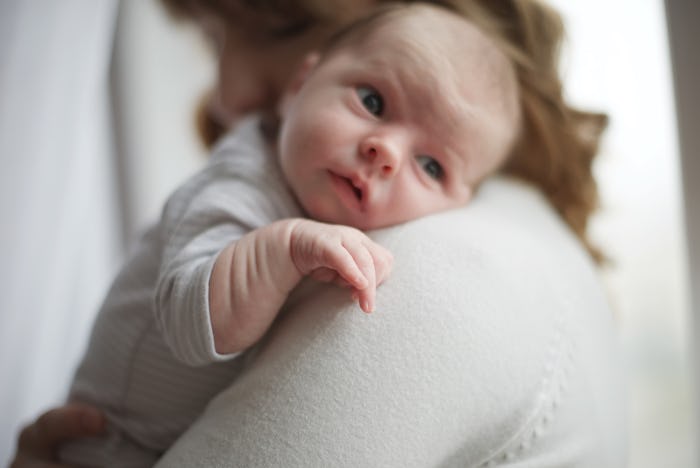Life

5 Signs & Solutions For Your Baby's Anxious Attachment
Anxiety is a common ailment, and it can strike anyone from infants to the elderly. The difficulty with babies experiencing anxiety, however, is that they have very few ways to communicate what they're feeling and get the help they need from you. For some babies, feelings of anxiety can become constant, and it can effect everything from their personality to the way they bond with you. There are some tell-tale signs your baby has anxious attachment issues, but luckily there are plenty of things you can do to help them work through it.
The theory of attachment and how it can effect people in childhood and as adults stems from the work of psychologist John Bowlby, according the University of California, Berkley. Although all parents would love their children to be secure in their attachments, it doesn't always work out that way. If your child happens to fall into the anxious attachment category, there's no need to panic. They're certainly not alone—a University of Illinois at Urbana-Champaign study estimated that up to 20 percent of children experience it.
Here are five behaviors to watch out for in your baby or toddler, and how you can respond to each of them in the most positive, help way possible.
1They're Clingy
All babies get clingy at times. Maybe they're sick, or overtired, or a little nervous to be in a new situation or place. Although that's normal, being constantly clingy could be a sign of anxious attachment, according to Psychology Today. Additionally, Kelly Mom noted that your baby could be picking up on your feelings of stress and anxiety, and latching on to you because they feel threatened by it. Make sure you're getting the help you need and taking time for self-care so that you can respond to your child with as much loving calm as possible.
2They're Constantly Watching You
A baby with an anxious attachment may feel the need to keep an eye on you all at times, according to the Science of Relationships. Parenting noted that a baby who's constantly looking to mom or dad may be seeking reassurance. They may be also reading your body language to figure out how to respond to whatever situation they're in, so it's important for them to see you happy and relaxed.
3They Have Mood Swings
The previously mentioned Science of Relationships article also noted that a child's mood swings may be caused by anxious attachment. Although it can be frustrating to try and figure out why a happy little one transforms into an crying mess in the span of a few minutes, Parents noted that it's important to not get angry and to stay calm to help your child work through it.
4They Throw Tantrums
Babies learn early that crying gets your attention. When it's their only form of communication, it has to signal everything from "I'm hungry" to "My diaper is dirty" to "I need a hug." If your little one has an anxious attachment and is seeking more attention from you, they could begin crying and throwing tantrums according to Good Therapy. Again, the best advice for dealing with your child acting out is to stay calm, according to Baby Center, and to remind them how much you love them.
5They're Hard To Soothe
If your baby or toddler is difficult to soothe once a meltdown begins, the aforementioned study from the University of Illinois at Urbana-Champaign noted that it could be due to anxious attachment. Your little one may be seeking your comfort, but on some level they may also be trying to "punish" you for their distress. Babble suggested using an infant carrier to keep your baby close and grow your bond.